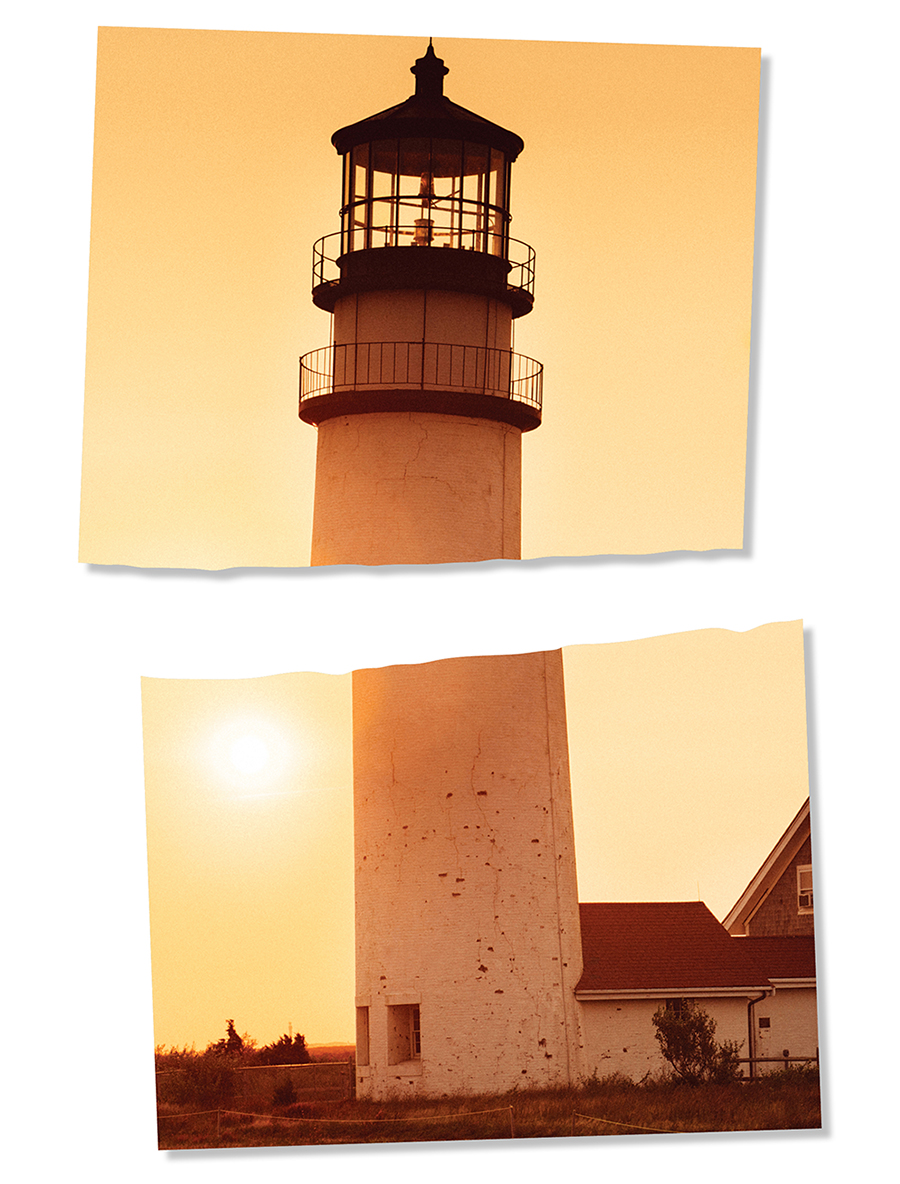Beauty Is in the Eye of the Beholder: An Expat’s Love Letter to New England
Come to New England for the lighthouses. Stay for the rude, distrustful, know-it-all loudmouths.

Illustration by Toan Trinh
On a cold night almost a decade ago, I stood drinking a pint at J.J. Foley’s on Kingston Street within earshot of a few friends. They were discussing possible challengers to Mayor Tom Menino, who at that point was at the apex of his power. After a quick exegesis on the fall of Kevin White and some back-and-forth about how everyone wished John Tobin would run because he was hilarious, or Chuck Turner, because his candidacy would be hilarious, one of them took a swig and concluded, “Know who would be good to talk to about this? Keohane—if he was still alive.”
By then I’d lived in the Boston area for 30 years, having been born and raised in Quincy and having spent years in a series of overpriced apartments of varying decrepitude in Medford, Somerville, and Cambridge. But I had decided to move. Not only move, but move to New York. That night at Foley’s was the farewell party. And it stands as a quintessential Bostonian moment for me: cool night, warm bar, smart people, deep history, and a hostility dispensed with the sort of casual ease most people reserve for bland pleasantries at the doughnut shop. It was a night for the ages, despite my being dead. My pasty ghost, sullied and shamed, has haunted New York ever since.
I’ve been thinking about that night lately, partly because it’s fall as I write this, which is when I miss New England the most, but also because I’ve been looking at tourism numbers that show that while much of America has fallen behind in attracting visitors—presumably due to the country having lost its mind in a very public, very humiliating way—New England is not only holding fast, but doing better. People are coming to the region in droves. Which is like having a painting so beautiful that people are willing to walk into a burning manure warehouse just to look at it.
While the U.S. Department of Commerce showed a 6.1 percent drop in travelers coming to the U.S. in the first half of 2017, international arrivals and departures were up 11.4 percent at Logan through August of last year. The number of passengers going through Rhode Island’s T.F. Green Airport is up more than 16 percent for the same period. Discover New England, the group that represents the region to other countries, reported that a record number of foreign tourists came to New England and spent a record $2.1 billion in 2016.
Domestic travel to Massachusetts through June 2017 was up about 4 percent, according to TSN Research. Tourism revenue in Connecticut was up 4.6 percent since 2013, the last time the state made a tally. In New Hampshire, room and meals revenue shot up 5 percent in the past year, and the state saw record-breaking toll numbers over Labor Day weekend. Vermont has seen room revenues rise more than 13 percent over 2016 (though some of that is due to the increased reporting requirements of Airbnb.) Meanwhile, Maine’s year-round tourism has held steady, and its winter tourism is up more than 10 percent.
Why is this significant? Well, for one, it’s gratifying, much as it pains me to admit. Even though tourists are a pox—taking up scarce subway seats and parking spots, walking five abreast on the sidewalk, driving like cowards, and just generally being in the way—it’s gratifying that people from all over the world will undertake significant expense and inconvenience to try to experience life as you do—if incorrectly, and only for a couple of days.
For another thing, it’s an interesting trend to watch from afar, because seeing people flock to a place you not only naturally take for granted but also left becomes cause for reflection. When you live somewhere for a long time, and then you stop living there, provided you can resist the tendency to sentimentalize it all out of proportion, you can separate what you thought was unique and elemental and immutable about the place from what really is. And then you wonder whether these visitors are getting any of that, or if they’re just wandering around numbly having money sucked out of their pockets doing the same things that prompted you to leave in the first place.
What does New England represent for these people? Why are they coming? What do they hope to take away? And what do I hope they take away from their time, based on my own?
The answer is simple: lighthouses.
Just kidding. It’s not lighthouses. Though you’d think, to look at tourism marketing materials, that New England was forested in them and that everyone lived in a thing with a giant novelty light bulb on top. The truth is, no one has ever come away from an encounter with a lighthouse anything but mildly disappointed. It’s a fact. The only appeal, as far as I can see, is to imagine the life of the poor bastard who used to live in that thing: the wind howling outside; the damp cold bleeding through the mortar; the total impossibility of finding a mate in such a situation.
While we’re on the topic of tourism brochures, let me add this: Lobster is overrated. It costs a fortune, the texture is terrible—like chicken mixed with gum—and more often than not, it serves as a convenient pretense for people who just want to eat butter, but can’t, because society says so. (At least society in New England. I can’t speak for the rest of the country.)
One more thing: The Cape is not worth your time. Unless you enjoy vacations that mostly involve sitting in traffic, punctuated by interludes of forking over a fistful of sweaty bills for a lobster roll or standing next to other sunburned people draped in Sox memorabilia taking pictures of some gray-shingled garage on Route 3. The secret is out, the Sagamore is bumper to bumper, and the Kennedys aren’t as fun as they used to be. Frankly, I would question the wisdom of a deity who decided to put a big beach so close to such a historically pale population; maybe He’s in the pocket of the dermatology industry—but that’s fodder for another essay.
My point is…okay, one more: Saddam Hussein himself couldn’t have devised better instruments for torturing children than the Freedom Trail and Plimoth Plantation. If poorly fitting costumery is what’s required to make history come alive, I’d just as soon it stayed where it is.
Okay. I know it’s folly to read tourism brochures designed to attract people to the place you’re from, but I’m doing it anyway. And as I expected, I’m finding many old bugbears: the image of New England as a quaint, placid, pumpkin-spiced paradise teeming with sea cockroaches and studded with useless lighthouses and misshapen Ben Franklins. It feels decidedly un–New England to try so hard to make people like you. But here’s the thing: They’re also…really making me want to go to New England.

iStock
The fact is: It’s all worth it. The fall foliage is worth it. It’s intoxicating. The winters are worth it, as are the springs. The Lakes Region in New Hampshire is worth it, and the White Mountains, and especially the Kancamagus Highway, which is like the Blue Ridge Parkway for people who have better things to do than drive around all day. Maple syrup is worth it. Cider doughnuts are worth it. The art scene in Providence is worth it—frankly, more so than Boston’s, with its shocking and shameful neglect of the non-institutional arts. The accents are worth it, to the extent that they still exist. Old Saybrook and those other stately, seasoned, stuffy, rich Yankee shore towns in Connecticut are worth it. Those pastel-ridden B & Bs in Vermont may look trite until you get inside one on a cold day, smell the fireplace, and park yourself by a window with a hot whiskey. Then they’re worth it. Walking across the Mass. Ave. Bridge from Cambridge toward Boston when the sun is setting, strolling down Comm. Ave. to Charles Street, and finishing with a drink on Beacon Hill—my God, is that worth it.
Even the tourist-choked shore places I avoid when the weather is good—your Capes and Kennebunks and Newports—in the cold, gray gloom of winter, are so worth it. Nantucket, though aesthetically fascist and populated by some of the weirdest rich people I’ve ever met anywhere, is worth it. The Beachcomber in Wellfleet might be one of the greatest bars on earth.
New England’s strength is its compactness. It’s a historical and geographical fluke. Sure, the skiing is pretty mediocre, but nowhere else can you go skiing and eat Barbara Lynch’s pasta in a single day. Sure, there are better museums elsewhere, but where else can you go to one, and then go apple picking, and then see a good national band? Sure, there’s more dramatic hiking elsewhere, but where else can you do it and then catch a flight?
Even the dead are better in New England. Nowhere else can you visit a more insane assemblage of graves: Henry David Thoreau, John Adams, Noah Webster, Milton Bradley, Christa McAuliffe, Robert Frost, Lizzie Borden, Mary Baker Eddy, Mark Sandman, Buddy Cianci, and so on. Nowhere else in America does history hang so heavily, even if sometimes it’s rendered into kitsch for the delight and edification of the itinerant yokelry. In a country of new and often tasteless, cheap things—a country driven by a mindless love of novelty governed by the edicts of planned obsolescence and short-term thinking—New England stands alone. And it knows it. And I love that.
Perhaps that’s why people are traveling to New England in ever-greater numbers. And to some, that might seem terrific. These people are coming, and they’re enjoying things that are arguably exclusive to New England. Fair enough. But to me, from this distance, they’re missing an opportunity. And if you think of these things when you think of New England, and visit these places when you want to get in touch with the region in its most elemental form, you are making a mistake, too. Because these things, contrary to these brochures I’m reading, aren’t what makes New England truly singular.
What does?
It’s the people.
I know, I know. When someone tells you “it’s the people” who make a place special, you can be assured that the people they are referring to are benign, offensively pleasant, and pointlessly friendly. Sometimes they’re worse than that, like when you go to a place and some total stranger just walks right up to you and says hello, like a serial killer. (I’ve had this happen. Minnesota, 1993. I still think about it, and laugh.)
So when I say it’s the people who make New England singular, I say it well aware of what I sound like. But I mean it. Having lived elsewhere and traveled a fair amount, I can say with confidence that there are no other creatures like New Englanders. They have sprouted organically from the soil of this historical and geographical fluke, they have fed on terrible weather and vicious religion, they have read a lot of books. They are stubborn, opinionated, aggressive, curt, contrary, distrustful, judgmental, irritable, and totally hilarious. (And warm and loyal, if you’re willing to put in the work, though you can probably get a law degree in less time.) They view bluntness as an act of mercy and politeness as pointless nicety. Their interest in you is to be earned, not assumed.
Yes, there are similar species out there: The Irish are sharp, funny, and brooding; the Israelis have a gift for cheerful rudeness and verbal roughhousing; the Russians have a gift for menacing rudeness and actual roughhousing. But none are quite like New Englanders.
I was emailing with a friend the other day, Susan McCarty. She’s a fiction writer who currently lives outside of Detroit after stints in Iowa, New York, Salt Lake City, coastal Maryland, Wellesley, and Provincetown. We were discussing what, as a person who has lived all over, she now considers core to the New England experience. Her response was so good it’s worth quoting in full:
“I traveled to Boston and Provincetown a couple of summers ago, after years away, and there is something really awesome about the sincerity of New England churlishness. Both my cab driver and my bartender, when I asked them questions about the area, became sort of suspicious and then irritated. I thought the bartender was going to bounce me, at 2 in the afternoon, after one beer. I can’t remember what I asked them, because it felt completely innocuous at the time, but I managed to piss off everyone I met, somehow. I’ve never lived anywhere else like that.
“People will tell you you’re crazy right to your face, two minutes after meeting you. That’s what I think of as the founding Puritanism. Not the religiosity but the fuck-youishness. There’s something so great about that. In this day and age, we’re used to being treated as children, as consumers. New Englanders are adults and they can take or leave your money. Which is probably why they’re getting so much of it right now.”
There’s a real contrarianism in New England, which is why liberals are always savaging other liberals for being incorrectly liberal, and then voting for Republican governors; or why Maine can vote against gun control and for legal pot in the same year. There’s a skepticism of anyone who seems too good, and a reflexive warmth for the wretched. I once interviewed Dennis Lehane for this magazine. He summed it up thusly: “If you say to me, ‘That is one of the finest members of our community,’ I’d be like, ‘Fuck that, he’s got skeletons in his closet somewhere—and probably worst than most.’ And then if you say to me, ‘Don’t talk to that guy, he’s a scumbag drug dealer,’ I’m like, ‘Hey, what’s up?’ I want to know what your humanity is.”
There’s also something about New Englanders that is ferociously, if quietly, moral. Not the preening, narcissistic, praying-in-the-public-square Southern Baptist kind of moral. But a granite-hewn, boots-on-the-ground moralism that is inextricable from Protestant hard work. Perhaps in their distrust, New Englanders see weakness more clearly, and in that weakness they see the possibility of redemption requiring work.
And this is where it gets good. For me, anyway. Say what you will about the area’s moonbat lefties—and I can say plenty as a former Cantabrigian—this native skepticism and vestigial Puritanism isn’t a repellent so much as it is an antibiotic. New England is an organism, and it is doing well because of the immunity provided by its character.
And it’s hard to talk about why people are flocking to New England without factoring in the state of the nation at large. With a few embarrassing exceptions—like the governor of Maine, who should be placed inside a cartoon rocket and launched into outer space—New England has resisted the raging humors that a good chunk of the rest of America has fallen prey to. It has served as a bulwark against the cruel and unlettered stupidity that has shamed the country and horrified the rest of the world.
Foreigners, studies have shown, are deeply turned off by what America became in 2017, but they’re still coming to New England. Much of America loves assailing the Northeast for not being part of the “real America,” but they’re coming here, too. And of course some of them are #MAGA idiots on the Freedom Trail looking for scraps of information that might reinforce their tragic misunderstanding of American history. But the reality is, the characteristics that make New England the fake America are the very same things that drove it to create America in the first place. Those haven’t changed. There is not a break between then and now. It’s a continuum: at once an escape from America, and an escape to America.
I left. I know. And I live in New York, which, though odious to local sensibilities and infuriating in many regards, represents to me much of what is right and true and valuable about the American experiment. And yes, we too are inundated with tourists, and I hate them and desperately want them to go away.
But I don’t want them to go back to where they came from, whether it’s Dubrovnik or Dublin or Duluth. I want them to continue north, to get closer to the source of what I consider singular about the Northeast, and the U.S., and the world. I want them to go deeper. And I’m glad, as a native New Englander, as a tarnished expat, and as an American, that they do. If one of them were to ask me what they absolutely had to do if they were heading up to New England, I’d say to them what I say to you: Go to Foley’s and ask someone what they think of you. That simple. And steel yourself, because they’ll tell you. And when they do, it’ll be magnificent.


